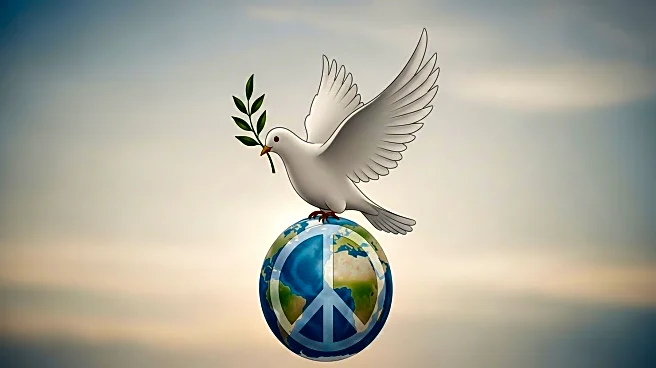What is the story about?
What's Happening?
Ukrainian President Volodymyr Zelensky announced that Kyiv would nominate U.S. President Donald Trump for the Nobel Peace Prize if he successfully halts Russia's military actions in Ukraine. This statement follows Trump's announcement of a ceasefire in Israel's conflict with Gaza. Zelensky emphasized that achieving a ceasefire would be a significant accomplishment, warranting recognition from Ukraine. Trump has previously expressed his desire to win the Nobel Peace Prize, citing his diplomatic achievements, including the Abraham Accords and efforts in North Korea and Kosovo-Serbia relations. Despite Trump's proposals, Russia has not agreed to a ceasefire, and tensions remain high.
Why It's Important?
The potential nomination of President Trump for the Nobel Peace Prize underscores the significance of diplomatic efforts in resolving international conflicts. If successful, Trump's actions could lead to a reduction in hostilities and pave the way for peace talks between Ukraine and Russia. This development could have profound implications for U.S. foreign policy, enhancing Trump's reputation as a peacemaker and influencing global perceptions of American diplomatic influence. However, the ongoing resistance from Russia highlights the challenges in achieving a lasting resolution, with potential impacts on regional stability and international relations.
What's Next?
The Nobel Peace Prize winner will be announced soon, with Trump among the speculated nominees. The outcome could influence future diplomatic strategies and international pressure on Russia to engage in peace talks. Zelensky's support for Trump's nomination may encourage other nations to advocate for diplomatic solutions, potentially leading to increased sanctions or military support for Ukraine. The situation remains fluid, with the possibility of further developments depending on Russia's response to international pressure and Trump's continued diplomatic efforts.
Beyond the Headlines
The nomination of President Trump for the Nobel Peace Prize raises questions about the criteria for such recognition and the role of political leaders in achieving peace. It highlights the ethical considerations of awarding peace prizes amidst ongoing conflicts and the potential for political motivations to influence nominations. The situation also reflects broader cultural and diplomatic shifts, as nations navigate complex geopolitical landscapes and seek innovative solutions to longstanding disputes.















